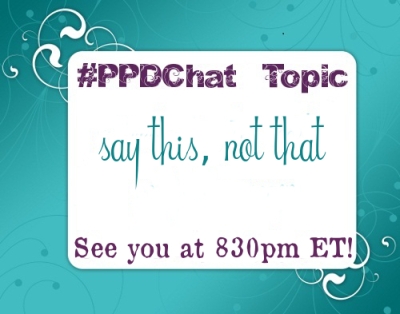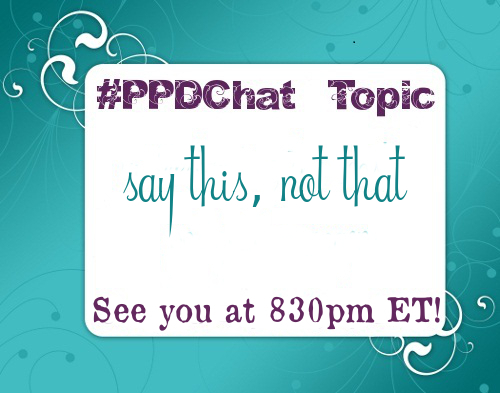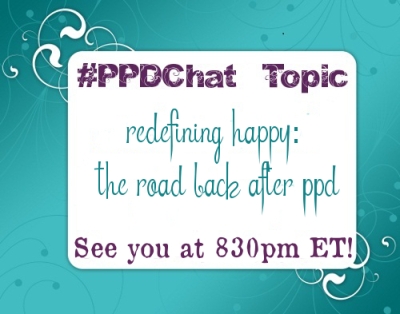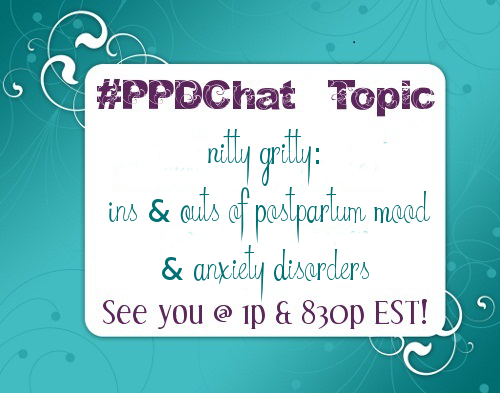The world of advocating and supporting those fighting the hard fight against Perinatal Mood & Anxiety Disorders holds within it a myriad of challenges. Moderating a community requires a lot – patience, compassion, understanding, and knowing when to properly apply tough love. The last one gets me every time -it is definitely a challenge and very heart-breaking to apply tough love to a struggling mama- but it is sometimes the only option left.
Within the #PPDChat community, some moms may end up being friends, others may just need me for a short period of time on their journey. I have to be okay with either, learning to let go as the moms who contact me move in a very fluid way in and out of my world.
My primary goal, however, is to keep everyone within the community safe above all else. To ensure that they feel respected, empowered, validated, and treated with all the dignity each of us deserves as humans and as adults, something all of us deserve. When someone within the community fails to meet this goal or feels these goals are not being met, I take action.
When there is a threat/disrespect for the community, a member requires more help than I or other members can provide, or threatens the safety of those close to them, I reach out for additional support. Dealing with threats to themselves or to the safety of the group is not a pleasant situation but it is something which is bound to crop up every so often. I must be prepared to provide solace for all involved – the community at large and the struggling member, without divulging too much information regarding either. Even though I am not legally bound by the classic “client/therapist” privilege rule, I hold myself to it unless threats are made. Even then, I only release information to the necessary parties.
Moderating #PPDChat has taught me a few lessons about dealing with people in general:
1) Be kind, for everyone you meet is fighting a hard battle. This one is tough because sometimes, when I would like to be angry at someone, I see their pain. I see the suffering which is causing their anger. I have learned when to dive in and hold a conversation but at the same time I have also learned when to walk away and let them fight their own battles with their dark storms. Sometimes, and this is perhaps the toughest lesson of all, people need to fight the storm on their own and we have to walk away because they are simply not prepared to let others put on their battle armor with them. I have found that if I need to do this, the best way to do so is to leave the door open as I walk out, in case they are ready to have an army by their side.
2) Be kind to yourself, for the battles you face may be harder than you think they are and it’s okay to not be okay. We all do it, tell ourselves that what we’re going through isn’t as hellacious as it should be – a lie. It’s okay to fight, it’s okay to hurt, and it’s okay to be kind to yourself. I say this often: Self-care is not selfish, it’s selfless. There is a fine line between self-care and selfish, however – it’s importance to balance taking care of your responsibilities with taking care of yourself. In the same vein, it’s okay to say no to extras. Things which are responsibilities take priority over things which are “supplemental” to life. To figure out the difference, make a list and ask yourself if life will go on if you skip something. Meal prep is a responsibility. Gotta eat. Making a ton of cookies for the church social? Yeah, saying yes might put you in the good graces but if it’s at the sacrifice of your sanity, it might not be worth it. Instead, choose to spend that time with your family or with yourself.
3) Everyone won’t be happy with the rules…or with what other people in the group have to say about certain topics. We all come to motherhood with different expectations and beliefs about how things should go. We all walk different paths and need to find the right path for us – in the process, remember that the right path for US may not be the right path for those around us. Judging the choices of others is something I DO NOT tolerate in the #PPDChat community because we are already judging ourselves as women, as mothers, and as mothers fighting a mental health battle. The LAST thing we need to add to that full plate is our support community judging us too. When personal attacks happen, tough love knocks down the door dressed up as a Mama Bear.
4) Treating others with dignity goes a long way. We’re dealing with other adults here, not with children. I don’t even see Teen Moms as children. They are mothers now, with very real adult responsibilities. To treat them, or any new mother, as anything less than an adult with responsibilities, is to disrespect them. You’re not helping if you’re constantly holding someone’s hand and telling them what they can or cannot do. It’s not empowering to talk down to them. Mental health struggles do NOT equal incapable. I was an adult prior to my postpartum issues and I was still an adult when I was fighting the beast. I treat others with the same respect and dignity with which I would want to be treated in the midst of my own storm. I believe it lends to confirming to the woman/family seeking help that they ARE still human, they DO matter, and it provides a sense of normalcy, if you will. It’s possible to acknowledge struggles without demeaning or patronizing the person experiencing them.
5) Authenticity is important. Sharing parts of yourself as a peer moderator builds trust. It shows your community that you are indeed human and understand their pain. Particularly online, it is important to not just be a robot spouting self-care-isms, if you will. Mean what you say and say what you mean. My community is perfectly aware of my rather unhealthy obsessions with bacon, football, F1, Star Wars, and a myriad of other things. Why? It humanizes me and therefore humanizes the community as we are able to bond with each other over a myriad of topics. It allows us to talk about things beyond our “labels.”
6) Know when to be light-hearted and when to be serious. There is a fine line between these two approaches, particularly when dealing with mental health issues. Cross the light-hearted line a bit too much and you may end up in the stigma/discrimination zone. That’s never a good thing. We joke a bit more about it in closed group but I am always, always careful about how I phrase things because I absolutely do not put up with any form of discrimination within the community. I see everyone one equal footing – as people fighting like hell to just be themselves, whatever that may be now. We need laughter but we also need respect and tough love. Toeing the line requires finesse, something I work diligently at achieving.
I’m sure there are more lessons I have learned whilst moderating the #PPDChat Community but the six above are perhaps the most important ones.
It is my utmost desire that everyone who reaches out to #PPDChat for support find a community which respects them as a whole person, respects their individual choices regarding child-bearing and child-rearing, and empowers them as they fight with all their might on their journey toward being well once again.
I know people feel that way because I hear it every so often from those who have participated. In fact, just the other day @jenrenpody shared this with me:
“I turned to ppdchat because I felt safe, validated and heard. I needed that validation and support. I found so much more – community and friendships.”
#PPDChat works to do exactly what Jen states and it always will. If for some reason, you have a different experience, let me know and I will do my best to address the issue. You are absolutely not alone, you will be heard, and you are safe. Always.
What would be most important to you in a peer-based community support group and why? Has #PPDChat helped you feel empowered to fight your battle against Perinatal Mood & Anxiety Disorders? Join in the discussion by sharing below!




 Thing is, those are all words.
Thing is, those are all words.
